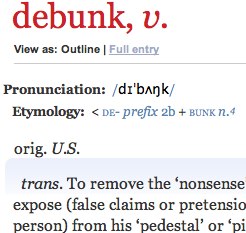
Why do I use the word "debunk", and not "skeptic"?
I call myself a debunker because "skeptic" is not a verb, and "investigator" is too limited.
This site is about doing skeptical analysis, about skeptical activism, about skeptical investigations. It's about the best ways to find and present the best evidence, and the soundest scientific work and theories. It's also about how to prevent the spread of bunk, and how to stop bunk forming in the first place. Debunking is an active verb - debunking is about doing these things. Simply being skeptical just sounds too passive. Simply "investigating" is only a piece of the puzzle.
Now "debunk", one might argue, has got a bit of a bad rap. Some people use the word "debunker" to mean someone who dishonestly argues for a particular position, regardless of the actual facts. Such a person might, in conspiracy culture, be described as a government or corporate "shill".
But in my experience, the word "debunk" still maintains a very honest meaning to most of the population. Even on conspiracy web sites you'll find people claiming that some subject has been "debunked" (although they tend to use the word from both directions, to debunk the debunkers). Example:
http://www.google.com/search?q=debunked site:abovetopsecret.com
Gives us:
- UPS902 Contrail Science plane theory debunked
- TimeWave Zero Thoroughly Debunked
- Reality of Climate Change - Hacked E-mails Debunked
- Evolution Officially Debunked!!!
- planet passing the sun debunked
- Phil Schnider Debunked!
- Mayan Calendar Questionable (Debunked?)
- Ed Krupp Debunked
- Debunked: FEMA Camps
- Chemtrail DC-10 Video Debunked
(That first result is an interesting read, the thread starter attempts to debunk my explanation of the "Mystery Missile", and continues to defend his debunking for a few days, but then does a quite dramatic about-face that leads some of his fellows to suspect he's a "disinfo" agent.)
So even in high-bunk zones, the terms "debunk" and "debunked" still generally holds its original meaning. Where we do have a bit of a problem is with the word "debunker".
http://www.google.com/search?q=debunker site:abovetopsecret.com
- Why do debunkers have an opinion about a conspiracy if they do not think it is real?
- 911 Debunkers Take Beating on ATS
- To Bunk Or Debunk...Newbrunswick photo...
- According to so called "debunkers" the Holocaust never happened
- Poor debunker illogical generalisations - why?
- Tinley Park UFO - Calling all the UFO debunker's out - Debunk this
- Debunking the Chemtrail Debunker
- Hello from an unabashed space CT debunker
- I Am A 911 Debunker and I Quit!!! No Evidence to Support Official Story
- Debunker harrasses and terrorizes 9/11 family members and truthers
A mixed bag there. But the general trend is that a "debunker" is someone who is defending the wrong side of the argument, from the perspective of the poster. In the first 911 story, we are described thusly:
With no sense of irony there, the poster uses the term "debunker" as a pejorative, while using the term "debunked" to describe something he and his cohorts have done. He then also castigates the debunkers for being impolite, then immediately lays into their lack of maturity and rationale (I think he means rationality).External Quote:In the last little while, these people who call themselves debunkers or blind believers of the official story have been getting a beating here on these forums as new threads appear that not only prove the official story is falsified but actually prove that insane people are willing to believe anything their news or officials tell them.
These debunkers or blind believers have gone to new lows in name calling, flaming, trolling, insulting, derailing and attempting to ruin the ATS experience but all became a failure on their part as most people identified them by their tactics, lack of maturity and rationale.Their debunking = Epic Fail.
Now, since they have been taking a beating here the next step is for these individuals or groups to start posting Bizarre, Stupid theories like , Directed energy weapons, pods, space beams, lasers, fuel tankers and other overly debunked material in attempts to pretend that it comes from 'truthers' which of course it they do not.
Then again in "Debunking the Chemtrail Debunker", the poster seems to simultaneously use "debunk" in both this positive and negative light. So I think really what's going on here is that 90% of the time when "debunker" is used negatively, it's just being used as a shorthand for "9/11 Debunker", "UFO Debunker", "Chemtrail Debunker", etc. They know that debunking is generally a good thing. The remaining 10% have just picked up on this shorthand, and have assumed that "debunker" itself if a term for some kind of disinformation agent.
Don't worry about that 10%. Debunking is the right word for what we do. It's unfortunate that it raises suspicions here and there, but sadly you are also going to get negative reactions from the same people to words like "skeptic", "investigator", "evidence based", "statistics", "wikipedia", and even "science".
Debunking. Getting rid of the bunk. It's what we do.
Last edited:



